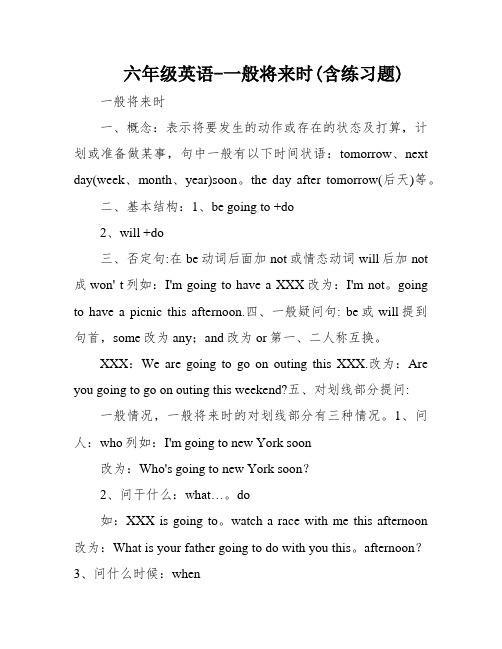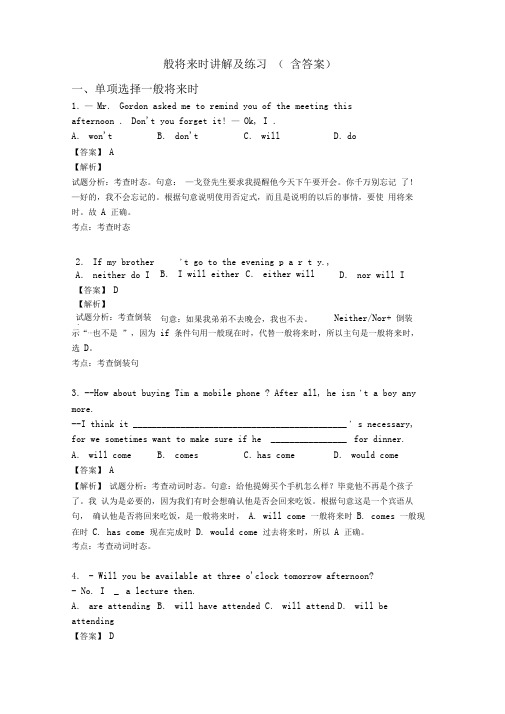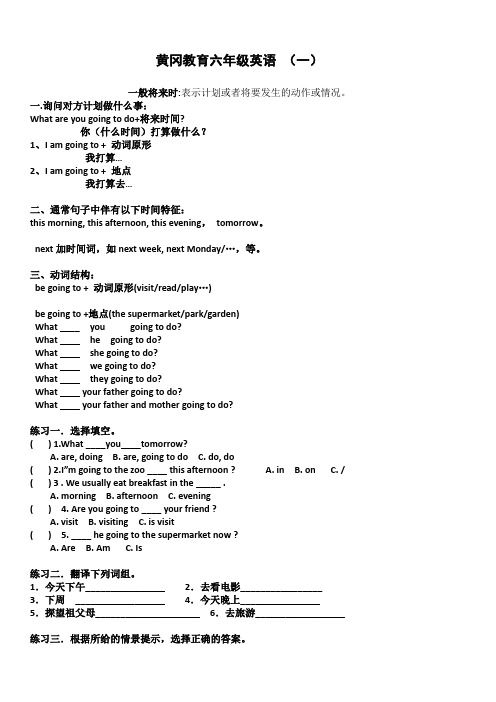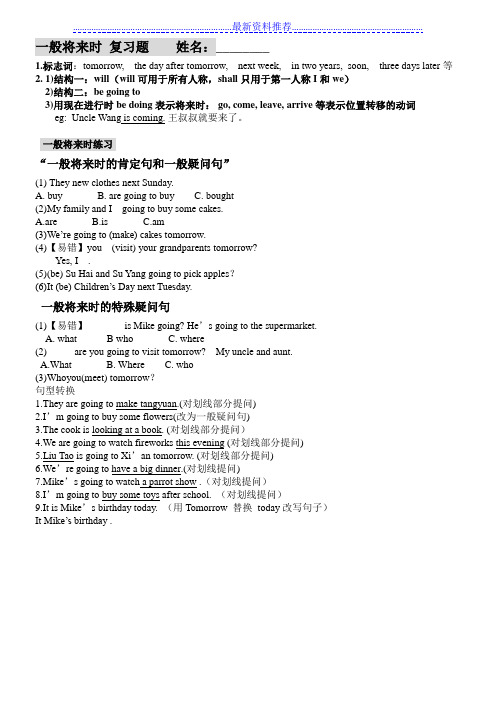一般将来时讲解及练习六年级
一般将来时讲义译林版六年级小升初语法专项复习

专题2 一般将来时讲义与练习(含答案)一、一般将来时定义一般将来时主要表示将来的动作或状态,在句子中由主语+be going to 来表达。
二、一般将来时关键词tomorrow(明天)、future (将来)、next ... (下一个...)、this afternoon(今天下午)、this evening(今天晚上)、soon(不久)……in two years(两天后)three days later (三天后)等三、结构1)结构一:will+动词原形(will可用于所有人称,shall只用于第一人称I和we)2)结构二:①主 +be going to+动原+ 其他.划提:What+ be + 主+going to do+ 其他?②主 +be going to+地点+ 其他.划提:Where + be + 主 +going+ 其他?3)用现在进行时be doing表示将来时:go, e, leave, 表示位置转移的动词例如:Uncle Wang is ing. 王叔叔就要来了。
专项练习一.用所给词的适当形式填空。
1、Today is a sunny day。
We (have)a picnic this afternoon。
2、My brother (go)to Shanghai next week。
3、Tom often (go)to school on foot。
But today is rainy, He (go)to school by bike。
4、What do you usually do at weekends?I usually (watch)TV and (catch)insects?5、It‘s Friday today。
What she (do)this weekend?She (watch)TV and (catch)insects。
6、What you (do)next Sunday?I (milk)cows。
六年级英语-一般将来时(含练习题)

六年级英语-一般将来时(含练习题)一般将来时一、概念:表示将要发生的动作或存在的状态及打算,计划或准备做某事,句中一般有以下时间状语:tomorrow、next day(week、month、year)soon。
the day after tomorrow(后天)等。
二、基本结构:1、be going to +do2、will +do三、否定句:在be动词后面加not或情态动词will后加not 成won' t列如:I'm going to have a XXX改为:I'm not。
going to have a picnic this afternoon.四、一般疑问句: be或will提到句首,some改为any;and改为or第一、二人称互换。
XXX:We are going to go on outing this XXX.改为:Are you going to go on outing this weekend?五、对划线部分提问: 一般情况,一般将来时的对划线部分有三种情况。
1、问人:who列如:I'm going to new York soon改为:Who's going to new York soon?2、问干什么:what…。
do如:XXX is going to。
watch a race with me this afternoon 改为:What is your father going to do with you this。
afternoon?3、问什么时候:when列如:She's going to go to bed at nine 改为:When is going to bed?六、同义句:。
般将来时讲解及练习六年级

一般未来时标志词:tomorrow, the day after tomorrow, next week, in two years, soon, three days later 等构造一: will (will 可用于全部人称, shall 只用于第一人称 I 和 we)一定形式:主+ will do 一般疑问: will + 主 + do否认形式:主+ won’t do特别疑问: what/when/where/which + will + 主+ doeg:1. we (know) the result soon. 我们很快就会知道结果了。
2. we (know) the result soon. 我们不会很快就知道结果的。
3. we (know) the result soon. 我们将会很快就知道结果吗?4. we (know) the result. 我们将在什么时候知道结果构造二: be going to+ be going to + do肯定形式:主一般疑问:be + 主 + going to + do否认形式:主 +be not going to + do特别疑问: what/when 等 + be +主+ going to + doeg: sky is full of black clouds. It to. 快要下雨了。
2 .But I think it rain. 但我感觉它不会下雨。
3 .it soon? 很快就会下雨了吗?4. you to tomorrow? 明天你要干什么?小小差别:往常状况下will 和be going to 能交换will,shall多习习用于表示是否愿意, 第一人称作主语的疑问句一般用 shall 不用will be going to 则多用于表示依据迹象判断将要发生某事,或许计划打算要做的事eg: 1. you drive to school tomorrow ? we mee t at 8:00 tomorrow?at the black clouds! Itrain.read some book in the librarythis afternoon.用此刻进行时 be doing 表示未来时:go, come, leave, arrive 等表示地点转移的动词eg: 1. Uncle Wang (come). 王叔叔就要来了。
一般将来时讲解及练习(含答案)

般将来时讲解及练习(含答案)一、单项选择一般将来时1.—Mr.Gordon asked me to remind you of the meeting thisafternoon .Don't you forget it! —Ok, I .A.won't B.don't C.will D.do【答案】A【解析】试题分析:考查时态。
句意:—戈登先生要求我提醒他今天下午要开会。
你千万别忘记了!—好的,我不会忘记的。
根据句意说明使用否定式,而且是说明的以后的事情,要使用将来时。
故A 正确。
考点:考查时态2.If my brother doesn 't go to the evening p a r t y.,A.neither do I B.I will either C.either willI D.nor will I【答案】D 【解析】试题分析:考查倒装句:句意:如果我弟弟不去晚会,我也不去。
Neither/Nor+ 倒装句,表示“⋯也不是”,因为if 条件句用一般现在时,代替一般将来时,所以主句是一般将来时,选D。
考点:考查倒装句3.--How about buying Tim a mobile phone ? After all, he isn 't a boy any more.--I think it _____________________________________________ ' s necessary, for we sometimes want to make sure if he ________________ for dinner. A.will come B.comes C.has come D.would come【答案】A【解析】试题分析:考查动词时态。
句意:给他提姆买个手机怎么样?毕竟他不再是个孩子了。
我认为是必要的,因为我们有时会想确认他是否会回来吃饭。
六年级英语一般将来时的语法总结及练习

黄冈教育六年级英语(一)一般将来时:表示计划或者将要发生的动作或情况。
一.询问对方计划做什么事:What are you going to do+将来时间?你(什么时间)打算做什么?1、I am going to + 动词原形我打算…2、I am going to + 地点我打算去…二、通常句子中伴有以下时间特征:this morning, this afternoon, this evening,tomorrow。
next加时间词,如next week, next Monday/…,等。
三、动词结构:be going to + 动词原形(visit/read/play…)be going to +地点(the supermarket/park/garden)What ____ you going to do?What ____ he going to do?What ____ she going to do?What ____ we going to do?What ____ they going to do?What ____ your father going to do?What ____ your father and mother going to do?练习一.选择填空。
( ) 1.What ____you____tomorrow?A. are, doingB. are, going to doC. do, do( ) 2.I”m going to the zoo ____ this afternoon ? A. in B. on C. / ( ) 3 . We usually eat breakfast in the _____ .A. morningB. afternoonC. evening( ) 4. Are you going to ____ your friend ?A. visitB. visitingC. is visit( ) 5. ____ he going to the supermarket now ?A. AreB. AmC. Is练习二.翻译下列词组。
(完整word版)六年级英语一般将来时讲解加练习

一般将来时一般将来时的定义:一般将来时表示将来某个时间要发生的动作或存在的状态,及计划、打算或准备做某事。
常常与表示将来的时间状语连用。
一般将来时的标志词:tomorrow, n ext day(week, mo nth, year …),so on, the day after tomorrow (后天)等。
一般将来时的结构:(一)“will +动词原形”这一形式,主要用于在以下几个方面:1、表示单纯的未来“将要”通用于各个人称。
They will go to visit the factory tomorrow. 明天他们将去工厂参观。
I ll come with Wang Bi ng and Yang Li ng我将和王兵、杨玲一起来。
The rain will stop soon. 雨很快就要停了。
(二)“be going t+动词原形”的形式,表示事先经过考虑、安排好打算、计划要做的事情以及已有迹象表明必将发生某事,意为“打算;就要”。
如:1)We're going to meet outside the school gate我们打算在校门口见面。
2) Dad and I are going to watch an opera this after noon.今天下午我和爸爸打算去看歌剧。
3) Look! It's going to rain. 瞧!快下雨了。
练习一.填空1. My brother ____ (go) to Shanghai next week.2. Mary _______ (see) her grandfather tomorrow.3. David ______ (fly) kites in the park this weekend.4.1 _____ (make) a plan for English study in three days.5. Who _____ (be) going to learn a new song next Tuesday?6. _____ (be) you going to Beijing tomorrow?7. We _____ (not be) going to have lunch at 12:00 tomorrow.8. Where _____ you ______ (leave) for tomorrow?9. _____ Tom _______ (have) a P.E. lesson next Monday?10. What ______ they _____ (watch) in thegym tomorrow?11. what ___ they ______ ( do ) tomorrow ?12. The boy _____ ( not have ) an English lesson tomorrow .13. ______ you _______ ( learn ) Chinese next week ?14.1 _______ ( arrive ) there tomorrow .15.Mike _________ ( not watch ) a movie tomorrow .二.选择填空1. ( ) She is going to ______ after school.A. listening to musicB. listens to musicC. listen to musicD. listened to music2. ( ) We _____ in Beijing in two days.A. will arrivesB. arrivesC. are going to arriveD. arriving3. ( )The students _________ d u m p l i n g s tomorrow.A. is going to makingB. are makingC. will makeD. are make4. ( ) Are you going to __________ thirteen years old next year? A. will be B. are C. be D. go5. ( ) ___will see a play in 5 days? A. When B. What C. Who D. Whose6. ( ) Mary ________ English next year.A. will learnB. will to learnC. are going to learn.D. learns 7. ( ) He ' ll _______ shopping this afternoon. A. going B. go C. goes D. went8. ( ) Will you _______ at the bus stop at 10:30? A. meeting B. meets C. meet D. met9. ( ) Lily and I ________ the guitar. next week.A. am going to playB. are going to playC. will playsD. play 10. ( ) How _________ Jenny ___ home tomorrow? A. does .... go B. is ................ g oing C. will .................. g o D. do ........ go 11. ( ) Who is going to __________ a song ? A. sings B singing C. to sing D. sing12. ( ) I _______ in Beijing in three days.A. are going to arriveB. arriveC. will arriveD. arrives 13. ( ) He _____ some model planes tomorrow . A. going to make B. is making C. will make D makes 14. ( ) Are you going to __________ a doctor next year ? A. will be B.. are C. be D. are going to 15. ( ) She ______ you make supper this evening .A. helpsB. will helpC. is helpingD. is going help 三.把下列句子变成一般疑问句,并给出肯定和否定回答。
新译林--一般将来时-讲解及练习-六年级

……………………………………………………………最新资料推荐…………………………………………………一般将来时复习题姓名:________1.标志词:tomorrow, the day after tomorrow, next week, in two years, soon, three days later等2. 1)结构一:will(will可用于所有人称,shall只用于第一人称I和we)2)结构二:be going to3)用现在进行时be doing表示将来时: go, come, leave, arrive等表示位置转移的动词eg: Uncle Wang is coming. 王叔叔就要来了。
一般将来时练习“一般将来时的肯定句和一般疑问句”(1) They new clothes next Sunday.A. buyB. are going to buyC. bought(2)My family and I going to buy some cakes.A.areB.isC.am(3)We’re going to (make) cakes t omorrow.(4)【易错】you (visit) your grandparents tomorrow?Yes, I .(5)(be) Su Hai and Su Yang going to pick apples?(6)It (be) Children’s Day next Tuesday.一般将来时的特殊疑问句(1)【易错】_______ is Mike going? He’s going to the supermarket.A. what B who C. where(2)_____ are you going to visit tomorrow? My uncle and aunt.A.WhatB. WhereC. who(3)Whoyou(meet) tomorrow?句型转换1.They are going to make tangyuan.(对划线部分提问)2.I’m going to buy some flowers(改为一般疑问句)3.The cook is looking at a book. (对划线部分提问)4.We are going to watch fireworks this evening (对划线部分提问)5.Liu Tao is going to Xi’an tomorrow. (对划线部分提问)6.We’re going to have a big dinner.(对划线提问)7.Mike’s going to watch a parrot show .(对划线提问)8.I’m going to buy some toys after school. (对划线提问)9.It is Mike’s birthday today. (用Tomorrow 替换today改写句子)It Mike’s birthday .。
(完整版)小学英语一般将来时讲解及练习

小学英语一般将来时讲解及练习一、一般将来时的定义:一般将来时表示在将来时间将要发生的动作或存在的状态,与表示将来的时间连用。
tomorrow, next day(week, month, year…),soon, the day after tomorrow(后天)等。
如:She will visit Shanghai tomorrow.二、一般将来时的构成1.一般将来时有两种构成形式:(1)主语+shall/will+do(2)主语+ be going to + do 在表示“打算到某地去时”由于谓语动词go与going重复,一般可以只说be going to a place。
三、一般将来时的用法1.(1)主语+shall/will+do (will可用于所有人称,shall只用于第一人称I和we) 这种结构不是表示自己的打算、意图或计划,而是表示未来的事实或对将来的预测等如:No one will do heavy work.Roberts will do everything for us.(2)主语+ be going to + do这种结构常用来表达自己打算做某事、计划做某事或者有意做某事。
注意:be 动词要与主语的人称和数一致,如:I am going to do some reading tomorrow.He is going to have a piano lesson next week.We are going to have a party this Friday.2.通常情况下will 和 be going to能互换,但是be going to 与will用法的也是有点区别的(1)只用will不用be going to的情况:①表示对未来时间与年龄的推测时,如:Tomorrow will be Monday.She will be thirteen next year.②表示必然发生时,如:Fish will die without water.People will die if all green plants die.(2)只用be going to而不用will的情况:如果表示已有迹象表明在不久的将来要发生的事情时,如:Look at those black clouds, It’s going to rain.3.某些动词如:go/come/leave/start/begin/arrive等,它们的现在进行时可以表示将来时,如:They are leaving for Shanghaitomorrow.My brother is coming here soon.四、一般将来时的句式变换肯定句:主语+shall/will+do主语+ be going to + do否定句:主语+shall/will+not+do(will not 可缩写成won’t)主语+ be+ not+ going to +do一般疑问句:shall/will+主语+ dobe+主语+going to+do特殊疑问句:疑问词+ shall/will+主语+do疑问词+be+主语+going to+do一般将来时练习题:一、用单词的适当形式填空。
- 1、下载文档前请自行甄别文档内容的完整性,平台不提供额外的编辑、内容补充、找答案等附加服务。
- 2、"仅部分预览"的文档,不可在线预览部分如存在完整性等问题,可反馈申请退款(可完整预览的文档不适用该条件!)。
- 3、如文档侵犯您的权益,请联系客服反馈,我们会尽快为您处理(人工客服工作时间:9:00-18:30)。
一般将来时标志词:tomorrow, the day after tomorrow, next week, in two years, soon, three days later等 结构一:will(will可用于所有人称,shall只用于第一人称I和we)肯定形式:主 + will do 一般疑问:will + 主 + do否定形式:主 + won’t do特殊疑问:what/when/where/which + will + 主 + doeg:1. we (know) the result soon.我们很快就会知道结果了。
2. we (know) the result soon.我们不会很快就知道结果的。
3. we (know) the result soon.我们将会很快就知道结果吗?4. we (know) the result.我们将在什么时候知道结果结构二:be going to肯定形式:主 + be going to + do 一般疑问:be + 主 + going to + do否定形式:主+be not going to + do特殊疑问:what/when等 + be +主+ going to + doeg:1.The sky is full of black clouds. It to .快要下雨了。
2.But I think it rain.但我觉得它不会下雨。
3. it soon? 很快就会下雨了吗?4. you to tomorrow? 明天你要干什么?小小区别:通常情况下will 和 be going to能互换will,shall多习惯用于表示是否愿意,第一人称作主语的疑问句一般用shall不用will be going to则多用于表示根据迹象判断将要发生某事,或者计划打算要做的事eg: 1. you drive to school tomorrow ? we meet at 8:00 tomorrow?2.Look at the black clouds! It rain.3.I read some book in the library this afternoon.用现在进行时be doing表示将来时: go, come, leave, arrive等表示位置转移的动词eg: 1. Uncle Wang (come). 王叔叔就要来了。
2. They (leave) for Beijing. 他们即将前往北京。
一般将来时练习一.连词成句并按要求改变句式(注意动词的正确形式)1、 children , at , study , home , will , on, computer , in the future肯定陈述句:一般疑问句:2、 back , they , month , later , a , get , will肯定陈述句:否定句:一般疑问句:3、he , is , going , a , to , patty , evening , this肯定陈述句:否定句:一般疑问句:特殊疑问句(问时间):4. China is a modern and strong country.(in twenty years)5. Do you study hard?(from now on)二、用括号中词的适当形式填空1、The bus ( come ).Please wait for a minute.2、 Guangzhou (将会) more bueatiful? Yes,3、How you (spent) you winter holiday ?4、People ( have ) less work to do in the future.5、we ( go) out tomorrow if it ( rain )三、选择正确的答案1. ( ) There an important meeting next week. A. will be B. will have C. will has D. will going to be2. ( ) Mr.Green to England tomorrow. A. fly B. flew C. is flying D. flies3. ( ) Mary will come back five o’clock. A. in B. after C. for D. later4. ( ) you go to the park tomorrow ? A. Will B. Shall C. Do D. Are5.( ) . The day after tomorrow they ________ a volleyball match.A. will watchingB. watchesC. is watchingD. is going to watch6.( ) .There ________ a birthday party this Sunday.A. shall beB. will beC. shall going to beD. will going to be7.( ) They ________ an English evening next Sunday.A. are havingB. are going to haveC. will havingD. is going to have8.( ) ________ you ________ free next Sunday? A. Will; are B. Will; be C. Do; be D. Are; be9.( ) He ________ there at ten tomorrow morning. A. will B. Is C. will be D. be10.( ) ________ your brother ________ a magazine from the library?A. Are; going to borrowB. Is; going to borrowC. Will; borrowsD. Are; going to borrows作业:一、单项选择。
( ) 1. There __________ a meeting tomorrow afternoon.A. will be going toB. will going to beC. is going to beD. will go to be( ) 2. Charlie ________ here next month.A. isn’t workingB. doesn’t workingC. isn’t going to wo rkingD. won’t work( ) 3. He ________ very busy this week, he ________ free next week.A. will be; isB. is; isC. will be; will beD. is; will be( ) 4. There ________ a dolphin show in the zoo tomorrow evening.A. wasB. is going to haveC. will haveD. is going to be( ) 5.–________ you ________ free tomorrow? – No. I ________ free the day after tomorrow.A. Are; going to; willB. Are; going to be; willC. Are; going to; will beD. Are; going to be; will be ( ) 6. Mother ________ me a nice present on my next birthday.A. will givesB. will giveC. givesD. give( ) 7. – Shall I buy a cup of tea for you?–________. (不,不要。
)A. No, you won’t.B. No, you aren’t.C. No, please don’t.D. No, please.( ) 8. – Where is the morning paper? – I ________ if for you at once.A. getB. am gettingC. to getD. will get二、动词填空。
1. I ______(leave)in a minute. I ______(finish)all my work before I ______ (leave).2. —How long _____ you _____(study)in our country?—I _____(plan)to be here for about one more year.—What ______ you ______(do)after you ______(leave)here?—I ______(return)home and ______(get)a job.3. I ______(be)tired. I ______(go)to bed early tonight.4. Mary’s birthday is next Monday, her mother _____ (give)her a present.三、句型转换。
1. People in the north often go skating in winter. (next winter)2. There are two cinemas in that town. (next year)3. He comes back late.(in two days)4.She is a conductor of a train.(soon)。
